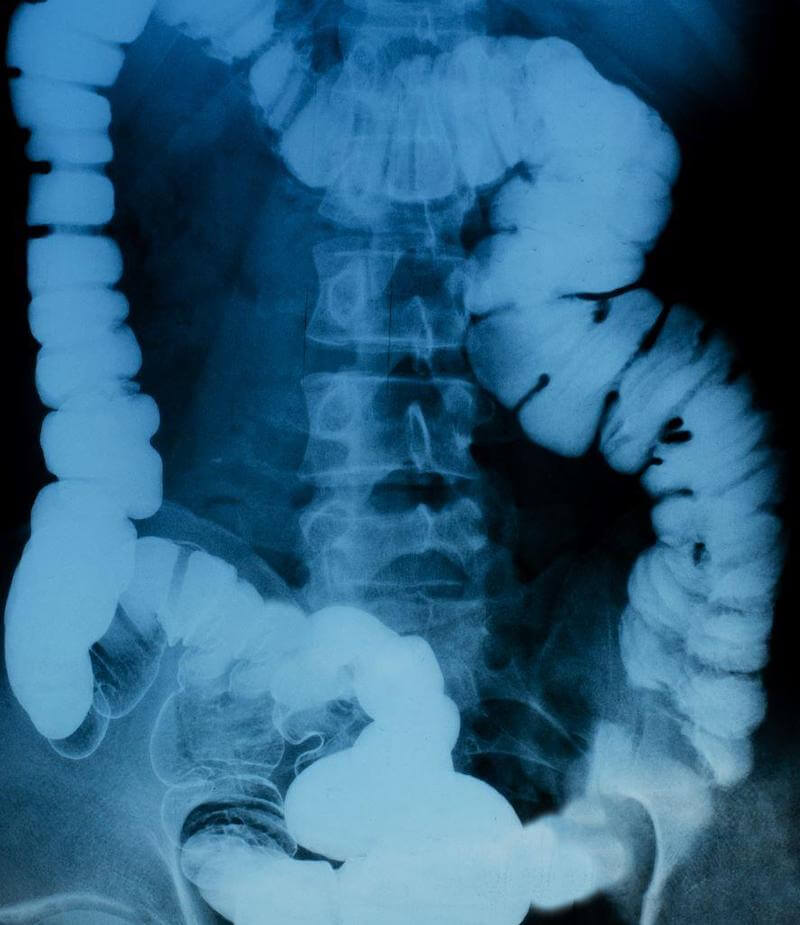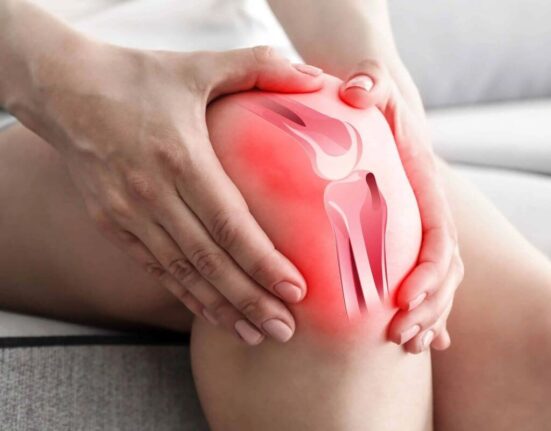Ulcerative colitis (UC) is a chronic inflammatory bowel disease that affects the large intestine. It causes inflammation and sores, or ulcers, in the inner lining of the colon and rectum.
It’s estimated that there are over half a million people in the United States who suffer from UC, and it’s one of the most common disorders diagnosed by gastroenterologists. Ulcerative colitis can be extremely debilitating and life-threatening, leading many people to search for ways to find relief.

Symptoms of UC can range from mild to severe and include abdominal pain, diarrhea, fatigue, weight loss, and anemia. If you suffer from UC, you may have heard about the potential benefits of turmeric for your condition. In this blog post, we’ll explore why turmeric may be beneficial for those with UC and how much you should take to get relief from your symptoms.
What is ulcerative colitis?
Ulcerative colitis is a form of IBD (irritable bowel disorder) that affects the digestive system. It’s caused by inflammation in the inner lining of the large intestine (colon) and rectum.

This inflammation leads to bleeding ulcers, which cause abdominal pain, diarrhea, fatigue, weight loss, and anemia. The exact cause of ulcerative colitis is unknown, but it’s thought to be related to a combination of genetic predisposition, environmental triggers such as viruses or bacteria, certain food sensitivities and allergic reactions, and an overactive immune system response.
Is ulcerative colitis genetic?
Ulcerative colitis (UC) is a serious inflammatory bowel disease (IBD) that affects millions of people worldwide. It’s considered to be both multi-factorial and genetically determined, meaning that there are certain genes that contribute to the development of UC.
While still not fully understood, research suggests that a combination of environmental, dietary, and genetic factors may play a role in UC development.
Studies have also shown that ulcerative colitis tends to run in families, which means if you have one parent with UC, your risk increases by 50%.
This could also be because parents feed their children what they eat, and if the food is highly inflammatory, all sorts of health issues can arise, including ulcerative colitis. It may seem like this condition is genetic, but the good news is that it is less genetic than the environment your digestive system is bathed in based on your food choices. So, while we cannot change our genetics, our diets certainly can get healthier. We can manage ulcerative colitis in a noticeably positive way with healthier food choices.
How can a healthier diet heal ulcerative colitis?
There is evidence that a healthy diet may help relieve the symptoms of UC. Studies have shown that people with UC who follow a Mediterranean-style diet tend to have better outcomes than those who don’t adhere to this type of eating pattern. The Mediterranean diet is lower in carbohydrates by design, usually offering more vegetables than the carbohydrate portion. This helps reduce inflammation.
The benefits of following this type of diet include reduced inflammation, improved gut flora balance, a decreased risk of developing cancer, and increased energy levels.
Mediterranean diet
- The Mediterranean diet is a way of eating that is based on the traditional foods of countries like Italy, Greece, and Spain.
- The diet emphasizes fresh, whole foods, including fruits and vegetables, whole grains, legumes, and olive oil.

- It also includes moderate amounts of fish, poultry, dairy, and red wine.
- The diet is low in processed foods, red meat, and sugar.
- The Mediterranean diet has been shown to offer a number of health benefits, including a reduced risk of heart disease and stroke, cancer, Alzheimer’s disease, and diabetes.
- The diet can also help to improve mental health and cognitive function.
- The Mediterranean diet is generally considered to be a healthy way of eating for people of all ages.
- There are a few things to keep in mind if you’re thinking about following a Mediterranean diet.
- First, the diet is based on fresh, whole foods, so it’s important to make sure you’re getting enough fruits and vegetables each day.
- Second, the diet includes moderate amounts of fish and poultry, so it’s important to choose leaner cuts of meat and to limit your intake of processed meats like bacon and sausage.
Take Note: Choose lots of healthy spices to flavor your food as you wish. This is where you can add as much turmeric to your food as you like to help heal inflammation in the large intestine.
How does an unhealthy diet contribute to ulcerative colitis?
A poor dietary intake can increase inflammation throughout your body, including your intestines, which can lead to ulceration and permanent damage in your colonocytes.

Additionally, an unhealthy lifestyle involving excessive alcohol consumption or smoking cigarettes can also inflame your digestive system and worsen symptoms related to UC. By switching to a healthier lifestyle focused on whole foods, vitamins, minerals, antioxidants, etc., you may be able to reduce or resolve symptoms associated with this condition.
Can turmeric help ulcerative colitis?
Turmeric has been used in Ayurvedic medicine for centuries due to its anti-inflammatory properties. Recent studies suggest that curcumin—the active ingredient in turmeric—may help reduce inflammation associated with UC by suppressing certain types of pro-inflammatory molecules called cytokines.

Turmeric is a root with a bright orange-yellow interior that is full of anti-inflammatory antioxidants that help those with ulcerative colitis.
Additionally, it’s believed that curcumin helps protect against damage caused by oxidative stress, which can exacerbate UC symptoms.
How much turmeric should I take for ulcerative colitis symptoms?
Because there are no clinical trials studying how much turmeric people with UC should take for symptom relief, it’s difficult to say definitively how much one should take. However, most experts recommend taking 400–600 mg per day, divided into two doses, with food or meals for optimal absorption.
Additionally, some studies suggest taking 500 mg daily for 4 weeks can reduce symptoms in people with milder forms of UC without having adverse effects on their health.

Research also suggests that combining turmeric with other herbs such as ginger or black pepper can increase its effectiveness at reducing inflammation associated with ulcerative colitis symptoms. Speak to your doctor before taking any herbal supplements, as they may interact with certain medications or have side effects if taken in high doses.
It’s easy to incorporate turmeric into your diet!

How about a delicious bowl of chicken curry and a potent dose of turmeric to help heal ulcerative colitis with it? Supplements are great, but food flavored with turmeric is certainly a bonus! Add some black pepper to your turmeric dish and get better bioavailability!
Can you eat pizza with ulcerative colitis?
Some people find that pizza once in a while doesn’t bother their ulcerative colitis, but perhaps their UC has not progressed enough. Pizza is a processed, highly inflammatory food that will cause inflammation.
Whether you feel pain or not will depend on the progression that your ulcerative colitis has taken up to this point. One day you may be able to eat pizza without too much discomfort, and soon in the future you may not be able to tolerate it anymore. One thing is for sure: Pizza does not help soothe or heal ulcerative colitis.
Concluding thoughts on turmeric and ulcerative colitis
Ulcerative colitis is a chronic condition that can cause debilitating symptoms such as abdominal pain and diarrhea
Ulcerative colitis is a chronic condition that can cause debilitating symptoms such as abdominal pain and diarrhea. While there isn’t a cure in Western medicine yet, there are ways to manage the condition, including lifestyle changes, diet modifications, medications, and supplements like turmeric.
We hope you find a way to increase your turmeric intake and enjoy its benefits!
More from thewellthieone.com
The links used on thewellthieone.com are affiliate links, which may provide a small commission. This does not increase the price of the goods for the consumer whatsoever. What it does is ensure that useful content like this can continue to be produced. Thank-you for enjoying our content and allowing us to continue to provide more.







